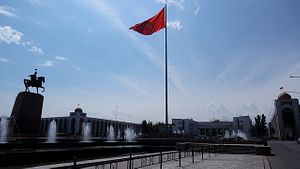Azimjon Askarov’s new hearing, which rights defenders hope will result in his release, began on July 11. The case is unprecedented in Kyrgyzstan and serves as a litmus test of sorts for the country’s political progress and the maturation of its legal system. Put simply: Kyrgyzstan has a chance to right a past wrong, but doing so casts a shadow on the country’s ruling administration.
Kyrgyzstan, as it likes to remind the world, hosts the region’s only real parliamentary democracy. Last October’s parliamentary elections were not perfect, but they weren’t rigged in the way other regional elections have been. President Almazbek Atambayev looks set to actually step down next year when his single term in the presidency, as mandated in the Kyrgyz constitution, is finished. When he steps down (barring unexpected constitutional hijinks) he’ll be the first president in independent Central Asia to leave power as scheduled.
But Atambayev’s time as president hasn’t been pristine. Indeed, the ethnic violence that accompanied the second Kyrgyz revolution–which, after an interim president, resulted in Atambayev’s election–is a significant black mark. Particularly troubling was the new government’s targeting of ethnic Uzbek activists and journalists who had witnessed and recorded the events. Askarov was one of them.
According to a 2012 International Crisis Group report, “[t]he bulk of deaths and physical damage took place in Osh itself” with mobs attacking predominantly Uzbek districts. “In subsequent trials, however, the majority of defendants have been ethnic Uzbek, giving support to the widely propagated theory in Kyrgyz political circles that the Uzbeks initiated the violence.”
On July 11, the Kyrgyz Supreme Court began an appeal prompted by the UN Human Rights Commission’s April decision on a complaint filed by Askarov that his human rights had been violated; he’d been denied a fair trial and subjected to torture. The UN HRC called for his immediate release and for his conviction to be quashed. Article 41 of the Kyrgyz constitution states that not only are citizens entitled to an appeal, but they have “the right to apply in accordance with international treaties to international human rights bodies seeking protection of violated rights and freedoms.” The kicker is this: “In the event that these bodies confirm the violation of human rights and freedoms, the Kyrgyz Republic shall take measures to their restoration and/or compensation of damage.”
Kyrgyzstan has the chance to make right a past wrong, but that includes tacit acknowledgement of that state’s abuses. The UN HRC was clear in its findings that Askarov’s rights had been violated and he should be released, but Askarov has become a flashpoint for tension, between various combinations of the country’s judicial branch, administration, local-level authorities and international observers. The Kyrgyz Supreme Court looks to be doing its job and holding a hearing, but it’s yet to be seen if politics will interfere with the court’s business. Shortly after the UN HRC made its decision, local authorities started moving toward seizing Askarov’s property–more than five years after his original conviction. The move had all the flavor of a punitive action on the part of local authorities angry about the case.
The July 11 hearing, reportedly packed and under heavy security, didn’t get very far. Askarov never appeared in court and the body adjourned early, citing the rules of procedure that the court could not make a decision without hearing the victim’s testimony. On July 12 the court is expected to reconvene.
Anna Lelik, for EurasiaNet, noted one detail from the first day that is particularly interesting. Nurbek Toktakunov, Askarov’s lawyer, “brought up the issue of Kyrgyzstan’s long-standing legal campaign to secure the extradition of Maxim Bakiyev, the son of deposed President Kurmanbek Bakiyev.”
“We all want to bring Maxim Bakiyev back to Kyrgyzstan to stand trial, but if the UN Committee’s decision is not fulfilled, they won’t even discuss it with us. It is a legal norm to decline extradition of people to countries where torture take place and where UN Committee decisions are ignored,” Toktakunov said.
Kyrgyzstan has not just its reputation on the line, but its desire for full justice against the country’s former rulers may hang in the balance as well.
Also of note, German Chancellor Angela Merkel is paying the country a two-day visit beginning on on July 13. Activists have urged her to press Askarov’s case.

































